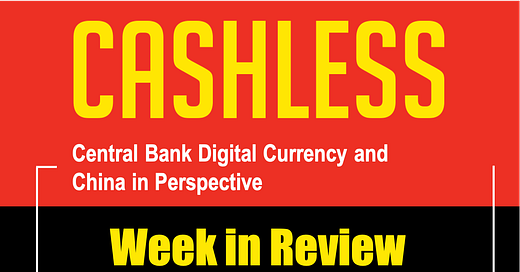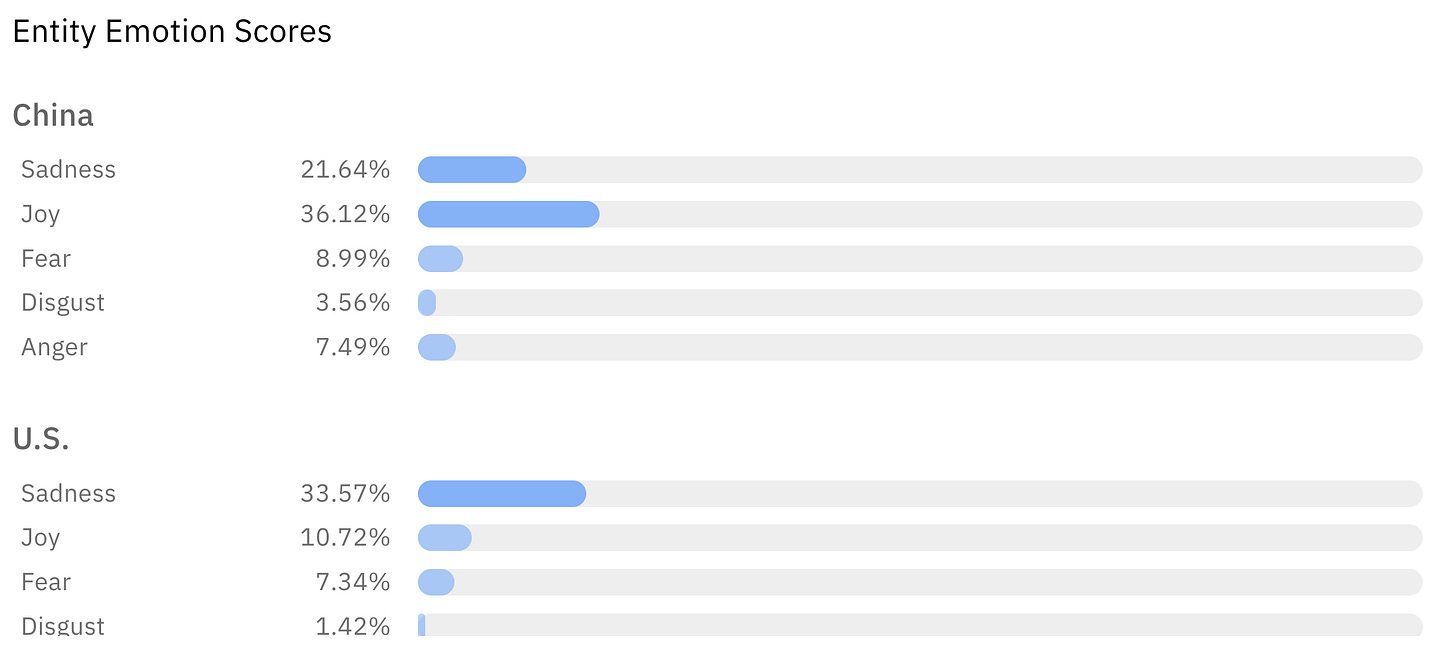The Digital Yuan doesn’t have surveillance “superpowers”, Innovation in China, Shanghai Exodus, and “Nein” for the Digital Euro
This week:
1. Stop the hysteria: China’s CBDC does not have surveillance “superpowers.”
2. China Innovation is controversial and goes viral
3. "Nein" for the digital euro
4. Shanghai’s exodus begins
1. STOP THE HYSTERIA: China’s CBDC does not have surveillance “superpowers.”
NEW LONG-FORM ARTICLE NOT POSTED ON LINKEDIN AND ONLY ON SUBSTACK!
Not a day goes by when I don’t read that China’s new central bank digital currency (CBDC) is a dystopian nightmare and a blow to privacy in China. Unfortunately, nothing could be further from the truth, and if we break it down, we can see how China’s digital yuan or e-CNY will be privacy positive for Chinese citizens.
What may surprise many is that the digital yuan provides a greater degree of anonymity when making purchases than the payment platforms Alipay and WeChat Pay that most of the nation uses now. And how about this, digital yuan provides greater anonymity than the credit cards you use now in the West…..
To finish reading head over here on Substack! (click on the picture or here)
2. China Innovation Post goes viral with over 300 thousand views
Posting an article on China’s Innovation program from "Foreign Affairs" magazine has been far more controversial than I ever dreamed. It's breaking viewing records for me, which I am grateful for but am left unsettled as I didn't intend it to be controversial. The article outlines key components of China's "secret sauce" for innovation.
The wordcloud above gives a flavor of the first 130 comments I received. You can see that “intellectual property” and “intellectual property theft” feature prominently in the discussion as well as other choice comments.
I will refer readers to the original post for links to the article and the lengthy discussion on innovation. (link below) Instead, I'd like to analyze the responses I received as they are unto themselves worthy of discussion. As you may have guessed, they are highly polarized, with the word cloud above showing 50 of their more meaningful words, which point out their diversity of opinion.
A vocal minority claims that China has no innovation skills whatsoever and that all of China’s developments were attributable to IP theft. As this is social media, a thick skin is required to wade through some comments.
My favorite negative comment of the batch ironically came from an innovator who claimed that:
"China has not graced the world with any innovation since the invention of laid paper, movable type print using ceramics, gunpowder and the magnetic compass."
Comments like this show the hostility to China's innovation.
To better understand the comments, I thought I'd let an unbiased judge analyze them and used “IBM Watson Natural Language Understanding Text Analysis" to take a look. The AI has many features, but I thought I'd keep it simple and look at sentiment analysis and emotion scores for the 130 responses I received.
The overall sentiment of the responses was surprisingly positive, with a significant number of reactions acknowledging China’s role as an innovator. They left positive responses that overall outnumbered the negatives. However, the sentiment scores for the words US and China were interesting, with many respondents reacting positively to China’s innovation while urging the US to do more for innovation. See below:
Sentiment analysis on 130 comments on the post. Overall the responses were positive with respect to China's innovation.
Now I will warn readers that the results of Natural Language Processing of the text are not definitive as they may miss user intent. Still, what was interesting is that emotional content surrounding the US and China showed how respondents thought of both countries. For example, the US received a high “sadness” score, reflecting people’s desire for the US to do more for innovation. In contrast, China received a high “joy” score reflecting positive comments about China’s innovation. See below:
The difference between China and the US in sadness joy and anger emotion scores shows how people think of to the countries.
Does China innovate? It would seem a silly question and, in my view, not particularly controversial. However, a quick look at the responses and the analytics show that many still don’t think this is possible.
I’ll let Chinese Sun Tzu (496 BC), general and author of “The Art of War,” close:
“There is no greater danger than underestimating your opponent.” Sun Tsu
Link to post for what I thought was a relatively non-controversial read
3. "Nein" for the digital euro
The early results of some 12,000 responses to the EU digital euro project are astounding, with a vast majority of responses starting with “Nein or gegen.” “No or against” in German.
This is no surprise given that 58% of the respondents were from Germany and Austria, both the biggest users of cash in the EU!
Survey results will be coming in until June 14th, but the results of the first two weeks are a shocker and worth an unscientific look here:
It's certainly hard to call these results definitive, given that the majority of EC residents barely know that there is a digital euro project underway. However, recent survey results back this up, and most EU citizens assumed it was a new cryptocurrency if they had any knowledge of the digital euro at all.
Still, with a vocal group opposed to the digital euro, this means that the European Central Bank design team will have to come up with a bullet-proof system of privacy! Then the ECB will have the arduous task of selling their version of privacy to the people.
Central banks are not known for their sales skills! And if these results are any indication, the ECB will be battling those who see nothing but doom from a digital euro for a long time.
The ECB is facing a long-drawn-out process. Still, I am optimistic about the outcome.
4. Shanghai’s lockdown exodus begins
The exodus begins as a poll of China expats reports that 40% will leave by the end of 2022 and another 30% will leave by 2023 or are considering leaving.
China’s COVID lockdowns are having a chilling effect on the expat community, with many reconsidering how long they want to remain.
Survey by “BonApp” one of the more popular expatriot English language restaurant and entertainment apps used in China. Survey released April 19th.
Before lockdowns, I had coffee with a friend who heads a successful design shop with 25 employees and has lived in China for nearly 20 years. He looked at me, sighed, and said, “you know I can do my work anywhere; maybe it's time.” It wasn’t the first conversation that went that way. I’ve had others.
Still, there is yet another group of friends who aren’t going anywhere like me. One English friend who has been here nearly 25 years, when asked about leaving, said it best, “bollocks!”
We've all been here for years, and China is home. Most of us shrug this all off, however painful, and remain optimistic that life will gradually return to normal. However, these lockdowns will be challenging to overcome for many in corporate jobs or the young who do not have such a strong attachment to the city. For example, a friend on a corporate posting with two children flew away yesterday.
There is no denying that the Shanghai government poorly managed the entire lockdown process and that many expats will reassess their priorities.
I've spent what seems like a lifetime here and don't have any plans to leave. Still, I'd be dishonest if I didn't tell you that not visiting family for two years is painful, and when I dream, it's usually of my family and food in my hometown in Italy.
PDF with survey results and longer discussion on LinkedIn
Control your future, subscribe!
More of my writing, podcasts, and media appearances here on RichTurrin.com
Rich Turrin is the international best-selling author of "Cashless - China's Digital Currency Revolution" and "Innovation Lab Excellence." He is an Onalytica Top 100 Fintech Influencer and an award-winning executive previously heading fintech teams at IBM following a twenty-year career in investment banking. Living in Shanghai for the last decade, Rich experienced China going cashless first-hand. Rich is an independent consultant whose views on China's astounding fintech developments are widely sought by international media and private clients.
My books:











